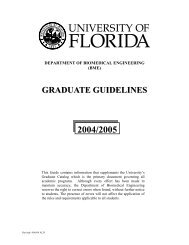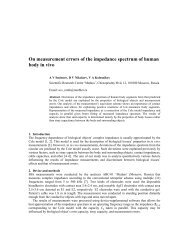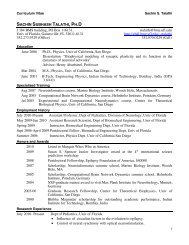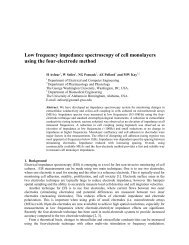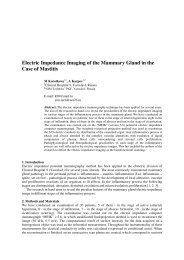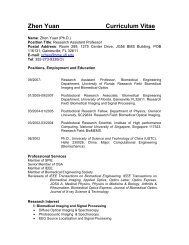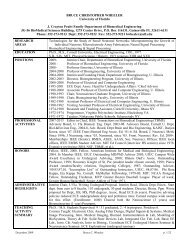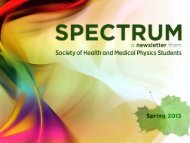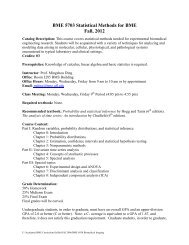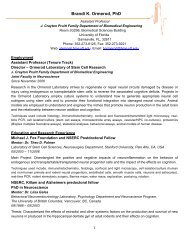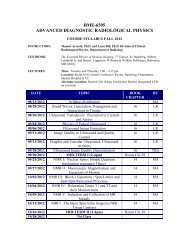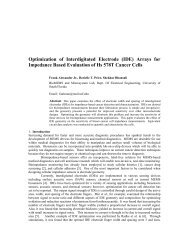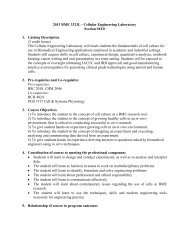Fall 2013 Syllabus - Biomedical Engineering - University of Florida
Fall 2013 Syllabus - Biomedical Engineering - University of Florida
Fall 2013 Syllabus - Biomedical Engineering - University of Florida
You also want an ePaper? Increase the reach of your titles
YUMPU automatically turns print PDFs into web optimized ePapers that Google loves.
BME 5703 Statistical Methods for BME<br />
<strong>Fall</strong>, <strong>2013</strong><br />
Catalog Description: This course covers statistical methods needed for experimental biomedical engineering research. Students<br />
will be acquainted with a variety <strong>of</strong> techniques for analyzing and modeling data arising in molecular, cellular, physiological, and<br />
pathological systems encountered in typical laboratory and clinical settings.<br />
Credits: 03<br />
Prerequisites: Knowledge <strong>of</strong> calculus, linear algebra and basic statistics is required. A previous course in<br />
statistical methods is expected. Students with only a basic understanding <strong>of</strong> statistics are expected to review the<br />
recommended texts within the first 2 weeks <strong>of</strong> the course.<br />
Instructor: Kyle D. Allen, Ph.D.<br />
Office: Room J389 BMS Building<br />
Office Hours: By appointment; Friday, 11:30-12:30<br />
Email: kyle.allen@bme.ufl.edu<br />
Class Meeting: Monday, Wednesday, Friday 4 th Period (10:40 am to 11:30 pm)<br />
Required textbook and s<strong>of</strong>tware:<br />
- No textbook is required.<br />
- Students are required to have Minitab<br />
- Free access to this s<strong>of</strong>tware is available through apps.ufl.edu (must be connected to UF VPN)<br />
Or<br />
- Student may rent a 6-month copy <strong>of</strong> Minitab at http://www.onthehub.com/minitab/ ($29.99)<br />
Or<br />
- Student may buy a permanent copy <strong>of</strong> Minitab at http://www.onthehub.com/minitab/ ($99.99)<br />
Resources and Recommended Texts:<br />
Introductory texts if you need to brush up on the basics<br />
A Concise Guide to Statistics – Ebook by Hans-Michael Kaltenbach<br />
Statistics for Non-statisticians – Ebook by Birgir Madsen<br />
What this course will focus on<br />
Statistics with applications to the biological and health sciences by Schork and Remington<br />
Applied statistics and probability for engineers by Montegomery and Runger<br />
A second course in statistics: Regression analysis by Mendenhall and Sincich<br />
S<strong>of</strong>tware Use<br />
All faculty, staff and student <strong>of</strong> the <strong>University</strong> are required and expected to obey the laws and legal agreements governing s<strong>of</strong>tware use. Failure to do<br />
so can lead to monetary damages and/or criminal penalties for the individual violator. Because such violations are also against <strong>University</strong> policies<br />
and rules, disciplinary action will be taken as appropriate. We, the members <strong>of</strong> the <strong>University</strong> <strong>of</strong> <strong>Florida</strong> community, pledge to uphold ourselves and<br />
our peers to the highest standards <strong>of</strong> honesty and integrity.<br />
What you need for this course<br />
What you need to bring to class<br />
1) Minitab 1) Notebook<br />
2) Review <strong>of</strong> Statistics Text 2) 3-ring binder or folder for handouts<br />
(if you think you are behind)<br />
(There will be a lot <strong>of</strong> them)<br />
3) Calculator or computer for lectures<br />
4) Laptop (if available) for in class demos
Format:<br />
This class is intended to be ‘applied statistics’ that emphasizes HOW things are done. The format will be 2-3 days <strong>of</strong> lecture<br />
describing WHY things are done a certain way, then 2-3 days <strong>of</strong> in class examples <strong>of</strong> how to APPLY these principles. Quizzes will be<br />
given to test a student’s understanding <strong>of</strong> the principles; homework will be given to test a student’s ability to apply those principles.<br />
Course Content:<br />
** I cannot guarantee that we will strictly follow the schedule below, but I will do my best. Due dates listed on the homework<br />
handouts are the true due dates; the dates listed below are the anticipated due dates.<br />
Section 1: Introductory Material<br />
Aug 21: Review <strong>of</strong> Basic Statistics, Central Limit Theorem<br />
Aug 23, 26: Probability Testing (Z-test, student’s t, Chi-squared, F-test)<br />
Aug 28, 30: In-class review <strong>of</strong> Introductory Material<br />
SECTION 1 QUIZ – Posted Aug 28, Due end <strong>of</strong> day Sept 4 (Sakai)<br />
SECTION 1 HOMEWORK – Handed out Aug 28, Due Sept 6<br />
Section 2: Analysis <strong>of</strong> Variance (ANOVA)<br />
Sept 4, 6, 9: Types <strong>of</strong> Errors, Power Analysis, and Analysis <strong>of</strong> Variance<br />
Sept 11, 13: In-class review <strong>of</strong> Analysis <strong>of</strong> Variance<br />
SECTION 2 QUIZ – Posted Sept 11, Due Sept 16 (Sakai)<br />
SECTION 2 HOMEWORK – Handed out Sept 11, Due Sept 18<br />
Section 3: Post-hoc tests<br />
Sept 16, 18, 20, 23: Post-hoc testing lectures<br />
Sept 25, 27: No Class – BMES, Review Handouts<br />
Sept 30, Oct 2, Oct 4: In-class review <strong>of</strong> Post-hoc testing<br />
SECTION 3 QUIZ – Posted Sept 30, Due Oct 7 (Sakai)<br />
SECTION 3 HOMEWORK – Handed out Sept 30, Due Oct 9<br />
Section 4: Nonparametric methods<br />
Oct 7, 9, 11: Nonparametric method lectures<br />
Oct 14, 16: In-class review <strong>of</strong> non-parametric methods<br />
SECTION 4 QUIZ – Posted Oct 14, Due Oct 18<br />
SECTION 4 HOMEWORK – Handed out Oct 14, Due Oct 23<br />
Oct 18: Assignment <strong>of</strong> Final Project Data Sets<br />
Section 5: Univariate regression analysis<br />
Oct 21, 23: Univariate regression lectures<br />
Oct 25: In-class review <strong>of</strong> Univariate regression<br />
SECTION 5 QUIZ – Posted Oct 23, Due Oct 28<br />
SECTION 5 HOMEWORK – Handed out Oct 23, Due Oct 30<br />
Section 6: Multivariate regression analysis<br />
Oct 28, 30, Nov 1, 4, 6: Multivariate regression lectures<br />
Nov 13, 15, 18, 20: In-class review <strong>of</strong> multivariate regression models<br />
SECTION 6 QUIZ – Posted Nov 13, Due Nov 18<br />
SECTION 6 HOMEWORK – Handed out Nov 13, Due Nov 22<br />
Nov 22: Buffer day and last chance to discuss final project…<br />
Nov 25, Dec 2, and 4: Project presentations<br />
**No Finals<br />
Grade Determination<br />
15% Quiz Grades (2.5% per quiz)<br />
60% Homework (10% per homework set)<br />
25% Final Report<br />
Grading Scale<br />
A A- B+ B B- C+ C C- D+ D D- F<br />
92.5-100 90.0-92.4 87.5-89.9 82.5-87.5 80.0-82.4 77.5-79.9 72.5-77.5 70.0-72.4 67.5-69.9 62.5-67.5 60.0-62.4 0-59.9<br />
* I will round your grade to the nearest tenth <strong>of</strong> a point; then, your letter grade will be assigned based on the above table. I do not<br />
curve grades. If the majority <strong>of</strong> the class is unable to answer a question, I will review the question and throw it out if it was<br />
unnecessarily difficult or confusing, but grades will not be curved.
UF Grading Policy<br />
Undergraduate students, in order to graduate, must have an overall GPA and an upper-division GPA <strong>of</strong> 2.0 or better (C or better). Note: a C- average<br />
is equivalent to a GPA <strong>of</strong> 1.67, and therefore, it does not satisfy this graduation requirement. Graduate students, in order to graduate, must have an<br />
overall GPA <strong>of</strong> 3.0 or better (B or better). Note: a B- average is equivalent to a GPA <strong>of</strong> 2.67, and therefore, it does not satisfy this graduation<br />
requirement. For more information on grades and grading policies, please visit: http://www.registrar.ufl.edu/catalog/policies/regulationgrades.html<br />
Academic Honesty:<br />
In adopting this Honor Code, the students <strong>of</strong> the <strong>University</strong> <strong>of</strong> <strong>Florida</strong> recognize that academic honesty and integrity are fundamental values <strong>of</strong> the<br />
<strong>University</strong> community. Students who enroll at the <strong>University</strong> commit to holding themselves and their peers to the high standard <strong>of</strong> honor required by<br />
the Honor Code. Any individual who becomes aware <strong>of</strong> a violation <strong>of</strong> the Honor Code is bound by honor to take corrective action. A student-run<br />
Honor Court and faculty support are crucial to the success <strong>of</strong> the Honor Code. The quality <strong>of</strong> a <strong>University</strong> <strong>of</strong> <strong>Florida</strong> education is dependent upon the<br />
community acceptance and enforcement <strong>of</strong> the Honor Code. We, the members <strong>of</strong> the <strong>University</strong> <strong>of</strong> <strong>Florida</strong> community, pledge to hold ourselves and<br />
our peers to the highest standards <strong>of</strong> honesty and integrity.<br />
On all work submitted for credit by students at the <strong>University</strong> <strong>of</strong> <strong>Florida</strong>, the following pledge is either required<br />
or implied: "On my honor, I have neither given nor received unauthorized aid in doing this assignment."<br />
Policy on working together (Group work)<br />
As peer-to-peer learning has been shown to enhance learning, students may work together on their statistics<br />
reports and final report. In fact, students are encouraged to work together on all coursework with the exception<br />
<strong>of</strong> the exams, but the work that is handed for grading in must be the individual’s work. The following policies<br />
on working together are in place:<br />
<br />
<br />
<br />
‘Working together’ is defined as each specific student contributing intellectually to all sections <strong>of</strong> the report.<br />
Direct copying is against the honor code <strong>of</strong> this institution and is not allowed. If identified, all students<br />
involved – those that copied and those that allowed the copying to take place – will receive a grade <strong>of</strong> zero<br />
and will be reported to the university for review.<br />
If students select to work as a collective, each student will turn in their own work. Dividing the work<br />
amongst the group is strictly against the intent <strong>of</strong> this policy, is strongly discouraged as it does not support<br />
peer-to-peer learning, and will be considered copying if identified (see above).<br />
Students that are working together must disclose which students were working together on the 1 st page <strong>of</strong><br />
the report after the honor code pledge.<br />
Policy on attendance<br />
I expect students to attend the class regularly and will send around an attendance log to keep track <strong>of</strong> who is and<br />
who is not attending. However, the attendance log is not part <strong>of</strong> the final grade, and you do not need to be<br />
excused in order to miss class.<br />
How will attendance information be used? -- If you are struggling in the course and have chosen to repeatedly<br />
miss lectures without an acceptable excuse, the attendance log will help me to decide how much <strong>of</strong> my effort<br />
you deserve in getting caught up. It will also help me keep track <strong>of</strong> student engagement.<br />
Policy on late coursework<br />
Unless prior arrangements have been made with the instructor, students will be deducted 15% per day for late<br />
coursework, with deductions occurring at the time associated with the end <strong>of</strong> class. The first deduction occurs<br />
at the end <strong>of</strong> class the day the work is due. Deductions will occur for late exams under the same policy;<br />
however, deductions will stop once the student scheduled a time with the instructor to take the make-up exam.<br />
Policy on grade corrections<br />
Students will have 1 week after receiving a grade to challenge errors or grading mistakes. At 1 week after<br />
students have been informed <strong>of</strong> their grade, the grade will become final and will not be changed. In other<br />
words, ask about errors and grading mistakes early -- do not wait for the end <strong>of</strong> the semester.<br />
Students with Disabilities:<br />
Students requesting classroom accommodation must first register with the Dean <strong>of</strong> Students Office. The Dean <strong>of</strong> Students Office will provide<br />
documentation to the student who must then provide this documentation to the Instructor when requesting accommodation.<br />
UF Counseling Services<br />
Resources are available on-campus for students having personal problems or lacking clear career and academic goals. The resources include:<br />
· UF Counseling & Wellness Center, 3190 Radio Rd, 392-1575, psychological and psychiatric services.<br />
· Career Resource Center, Reitz Union, 392-1601, career and job search services.



